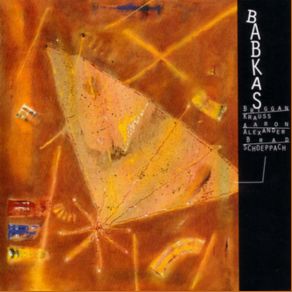Babkas
Download links and information about Babkas by Babkas. This album was released in 1993 and it belongs to Jazz, Rock, World Music, Alternative genres. It contains 15 tracks with total duration of 01:07:07 minutes.

|
|
|---|---|
| Artist: | Babkas |
| Release date: | 1993 |
| Genre: | Jazz, Rock, World Music, Alternative |
| Tracks: | 15 |
| Duration: | 01:07:07 |
| Buy it NOW at: | |
| Buy on iTunes $9.99 | |
| Buy on iTunes $9.99 | |
Tracks
[Edit]| No. | Title | Length |
|---|---|---|
| 1. | Your Sign Here | 8:47 |
| 2. | Stretch | 1:35 |
| 3. | Clang | 9:17 |
| 4. | Czugy Stodel | 6:25 |
| 5. | Quaynopheky | 1:07 |
| 6. | Hungarian Dance #20 | 3:21 |
| 7. | Piglet | 1:50 |
| 8. | ...But First, a Cookie | 8:57 |
| 9. | Walla | 3:11 |
| 10. | Xin | 1:12 |
| 11. | Tarc Looma | 4:11 |
| 12. | Plaw | 7:28 |
| 13. | Gzbsh | 3:37 |
| 14. | Jerry's Birthday | 5:24 |
| 15. | Big Bird Razor | 0:45 |
Details
[Edit]The 1993 debut by the Babkas trio brought something entirely different to the downtown New York jazz scene. The guitar/saxophone/drums lineup of Brad Schoeppach, Briggan Krauss, and Aaron Alexander presented a powerhouse of composition, improvisation, and technical jazz and rock prowess in one trio. Their debut is one of outrageous textures and wildly adventurous stylistic explorations. Schoeppach's "Your Sign Here" is an exercise in scalular improvisation with Krauss and Schoeppach trading fours on a melody based solely on arpeggios. Then it's off to the races as each takes a harmonic approach to scaling in the solos. Overtonal excess leads to more as Krauss, not to be outdone, starts quoting "Cherokee" in the middle. On the band's noised-out "Stretch," guitar wrangling and percussive machinations are supplanted by off-minor soloing from Krauss. But the true diversity of this band's character comes in its reading of Brahms' Hungarian Dance #20. The somber melody is played so formally and sweetly you'd swear this was a rock band trying to play classical music. Instead it's a jazz band seeking the nuance and fickle sonances in a tight space where harmony and melody are lyrically entwined as the same thing. After stating the opening somber march, the band opens it up, note for note, into the wacky mazurka it is, turning both metric and rhythmic changes inside out to accommodate the speed — played at four times the pace of the score. As displayed here and in other places on this set such as "Piglet" and "Jerry's Birthday," there are moments when the trio seems to float out of the categorization box and land somewhere near the edges of the musical universe, where the twin leads of Krauss and Schoeppach and their sinewy communication leave a roomful of space for Alexander to become the bridge and the gateway to further sonic exploration. The album is one muscular workout after another that leaves the listener exhausted. And perhaps that's its only drawback: There is so much musical prowess on display it leaves very little room for musical levity. It's still an auspicious debut though.